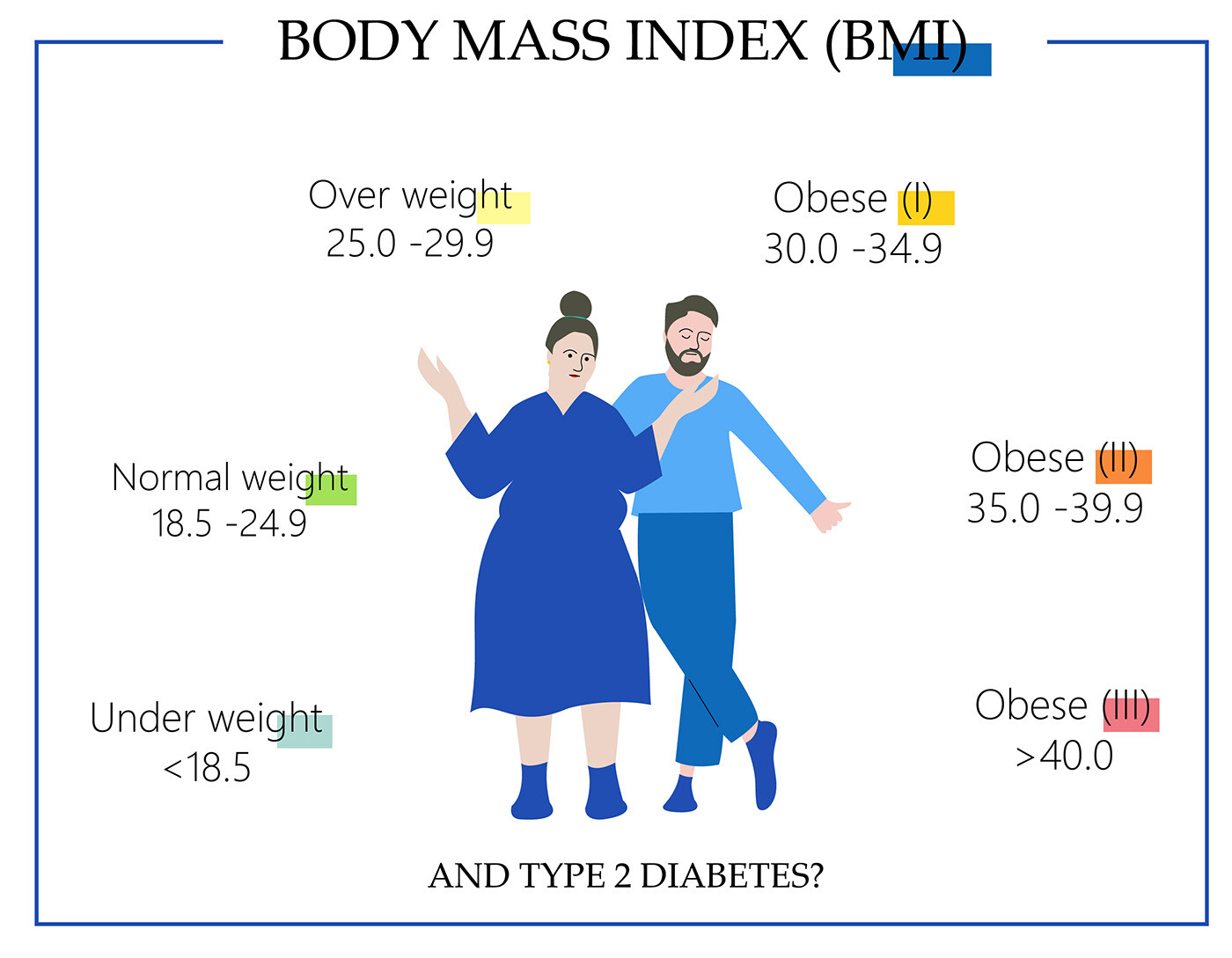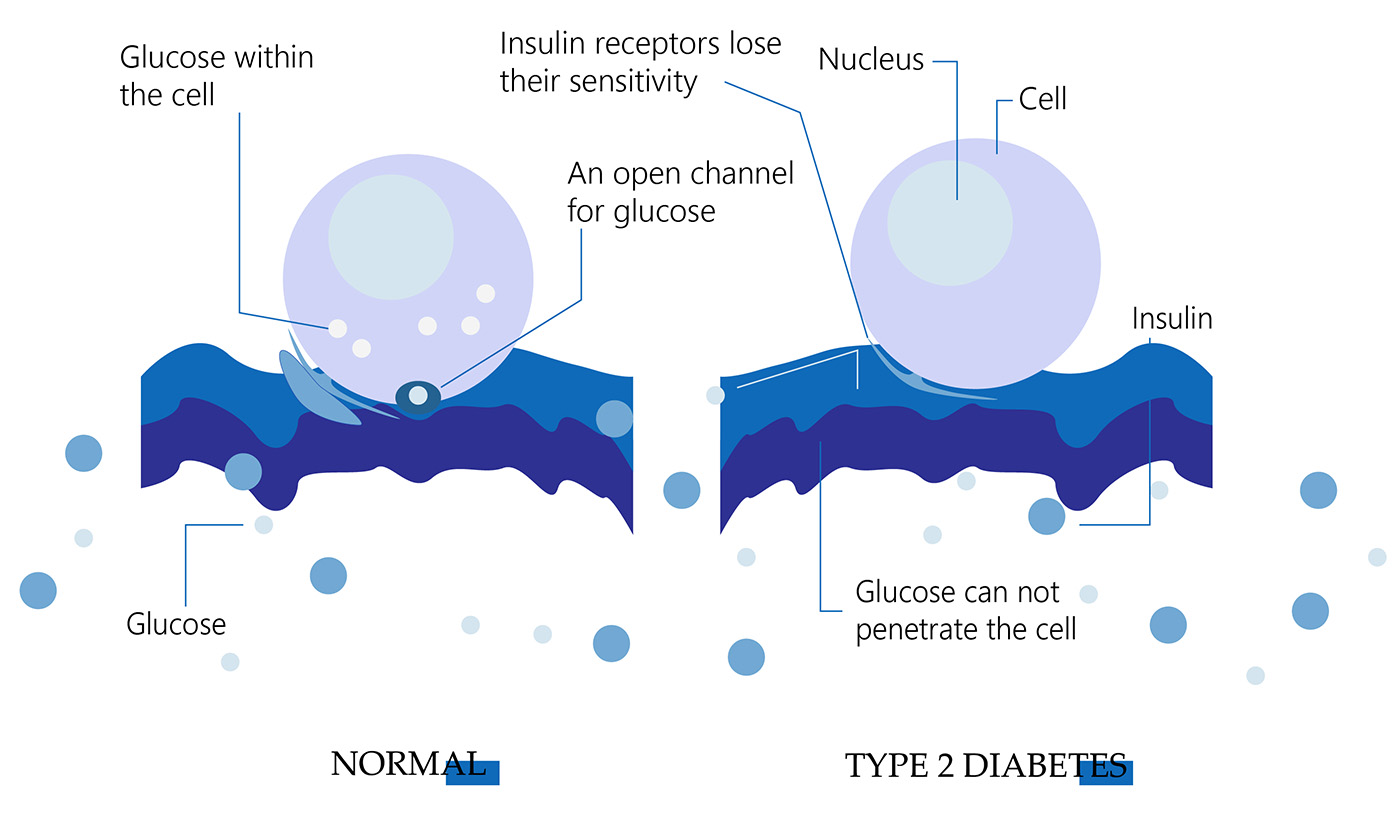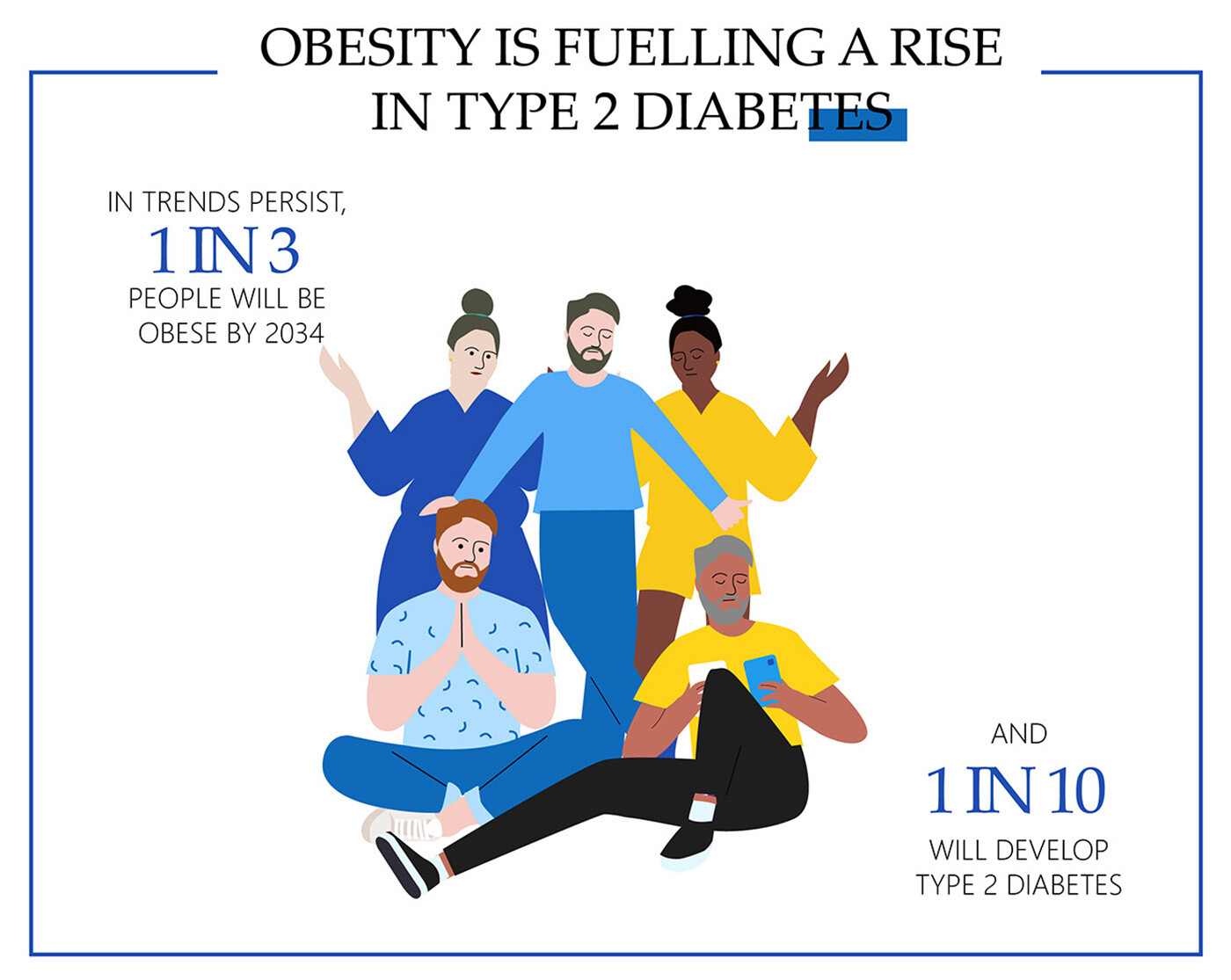Obesity And Type 2 Diabetes
Being overweight or obese doubles the likelihood of developing type 2 diabetes, the most common type of diabetes. The body produces enough insulin in this disease, but the cells have become resistant to insulin's beneficial effects. So why are obesity and type 2 diabetes connected, and why is it happening?
What Is Obesity?
Obesity and excess weight can have a variety of adverse effects on a person's health. There are numerous methods for determining how much excess weight a person has. Body mass index calculation is one of these methods for Body Mass Index (BMI). It's calculated by splitting one's mass in kilograms by one's height in meters squared. In addition, there're multiple weight status classifications (underweight, average weight, overweight, and obesity).
How does obesity progression cause type 2 diabetes? Keep reading to find out the connection between obesity and type 2 diabetes.
What Are Obesity Types?
Obesity varies across individuals based on the body's response to the type of diet and exercise they engage. The following are the five types of obesity:
- Dietary obesity;
- Weight gain due to sensitive stomach;
- Genetic metabolic obesity;
- Venous circulation obesity;
- Inactivity obesity;
- Gluten obesity.
The Risks of Obesity
Obesity raises a person's chances of developing:
- Hypertension that can increase high blood sugar;
- diabetes type 2;
- cancers of specific types;
- osteoarthritis is a type of arthritis that affects the joints (the breaking down of cartilage and bone);
- stroke;
- dyslipidemia is a type of dyslipidemia (consisting of high blood cholesterol and triglycerides, a type of fat).
Obesity and Insulin Resistance
Insulin resistance can occur due to genetics and lifestyle factors, resulting in an inflammatory process in the body. Excess feeding is one of several physiologic stressors that might trigger insulin resistance leading to type 2 diabetes obesity.
Look at the representation below to see which BMI is auspicious for type 2 diabetes development. What fat percent of type 2 diabetes is caused by the progression of obesity?

When this happens, the body struggles to keep blood sugar levels stable. As a result, more balanced blood sugar levels insulin is produced from beta cells in the pancreas to balance blood sugar levels. A tug-of-war follows between forces seeking to remove and store sugar in the body's cells and those cells themselves that are "full" and becoming less responsive to insulin's activities.
But what is the connection between the development of type 2 diabetes and obesity? Keep on reading to learn the reason.
What Is the Connection Between Type 2 Diabetes and Obesity?
It's unknown why some people acquire insulin resistance, but the connection between obesity development and type 2 diabetes is in a lack of physical exercise, which worsens the condition. Therefore, insulin resistance is a critical factor in the development of the disease.
The correlation may also be observed because losing weight can help control or cure type 2 diabetes obesity. Aside from the degree of obesity, the location of extra body fat is significant in predicting the risk of the disease.
A person with an "apple" body shape has the highest level of insulin resistance and the highest prevalence of type 2 diabetes. This is because these people around their abdominal area carry the bulk of their weight gain. The "pear" shaped individual, on the other hand, has the majority of their weight in the hips and thighs, which is less likely to be related to insulin resistance.

How Does Obesity Cause Type 2 Diabetes?
When obese or overweight, their body produces more insulin to get glucose from the blood that helps compensate their adipose tissue, leading to insulin failure.

Inflammatory Response
As type 2 diabetes progresses, the body's insulin sensitivity decreases, and the ensuing insulin resistance causes inflammation. Thus, a vicious cycle can develop, with increased inflammation leading to increased insulin resistance and vice versa.
Disruption in Fat Metabolism
A metabolic syndrome is a group of diseases that occur in tandem and increase your risk of heart disease, stroke, and type 2 diabetes. These diseases include excessive blood pressure, high blood sugar, excess body fats around the waistline, and excessive cholesterol or triglyceride levels.
Genetic Factors Connected with Obesity and Diabetes
How is type 2 diabetes is related to genetic obesity factors? If you've been confirmed with type 2 diabetes, you're probably not the only person in your family to have the disease. If you have a parent or sibling who has the disease, you are more likely to get it as well.
Does type 2 diabetes have generic factors that cause obesity? Several gene mutations have been related to the onset of type 2 diabetes. These gene variants can interact with one other and with the environment to raise your risk. Thus, both hereditary and environmental factors contribute to the development of type 2 diabetes.
Several gene alterations have been related to an increased risk of diabetes, according to researchers. Diabetes does not affect everyone who possesses a mutation. However, many people with diabetes have one or more of these mutations.
Obesity and Type 2 Diabetes Statistics
Here you're with obesity development and type 2 diabetes statistics. Diabetes affects 9.4% of the overall population in the United States (30.3 million people). A total of 23.1 million individuals have been diagnosed, and 7.2 million people are oblivious that they have the illness.
Previously thought to be only a weight-loss procedure for patients with severe obesity, accumulating data over the last two decades supports metabolic surgery as a successful treatment for type 2 diabetes, resulting in improvement or remission in most cases.
Obesity is thought to account for 80-85% of the risk of getting type 2 diabetes, with current studies indicating that obese persons are up to 80 times more likely to acquire type 2 diabetes than those with a BMI less than 22.

Treating Obesity Will Treat Type 2 Diabetes
Weight reduction is an essential objective for those who have obesity-related to diabetes type 2. Obesity can be successfully treated with a diet, exercise, and behavior modification program, although medication and surgery may be required.
Diet
When energy expenses are higher than calorie consumption, weight loss happens. Creating an energy deficit of 500-1,000 calories per day will result in a weekly weight reduction of one to two pounds. It has been discovered that writing down the meal, portion size, and calorie quantity increases consciousness and provides objective proof of calorie consumption.
Physical Activity
Daily physical exercise aids in the maintenance of weight reduction and the prevention of weight return. It also improves insulin sensitivity and glycemic control, lowers the chance of acquiring diabetes, and lowers mortality in diabetic individuals.
Set a target of 30 to 45 minutes of moderate activity five times each week. The action doesn't have to be done all at once to be helpful. Dividing the exercise into many brief sessions will improve results and can improve compliance.
Medication
Several medicines are available to treat diabetes, insulin resistance, and obesity. For example, Metformin injections effectively lower the risk of type 2 diabetes in people with insulin resistance. In addition, Metformin, a non-insulin treatment, slowed the development of diabetes in those with obesity and poor glucose tolerance.
Bariatric Surgery
The natural digestive mechanism is altered by bariatric surgery. Surgery is classified into three types: restrictive, malabsorptive, and combination restrictive/malabsorptive. The National Institutes of Health website explains the procedures and how they result in weight reduction.
Diabetes can be treated in many individuals via bariatric surgery, according to research. These clinical benefits occur due to considerable weight reduction and hormonal changes caused by meals that pass through the stomach.
Preventing Obesity
Many of these obesity prevention techniques apply to reducing or maintaining a healthy weight as well. Bottom line: eating a balanced diet and increasing physical exercise can help avoid obesity.
- Reduce your intake of "bad" fat and increase your intake of "good" fat.
- Limit your intake of carbohydrates and sugary meals.
- Consume more veggies and fruits.
- Eat lots of dietary fiber.
- Consume foods with a low glycemic index.
- Involve your family in your trip.
- Participate in aerobic exercise regularly.
- Reduce your everyday stress.
One of the significant reasons that childhood obesity prevention is so vital in children is that childhood obesity continues in adulthood as the kid grows. Unfortunately, that increases the individual's risk of diabetes, high blood pressure, and heart disease.
Summary and Conclusions
Now, you know how obesity causes diabetes type 2. People who suffer from obesity are at a higher risk of acquiring type 2 diabetes, commonly known as insulin-resistant diabetes or adult-onset diabetes. That is a condition in which your blood glucose level is consistently elevated.
Obese people are up to 80 times more likely than non-obese ones to acquire type 2 diabetes. Insulin enables your cells to utilize glucose (sugar) as an energy source. When insulin-resistant, your body can't convert glucose into energy, resulting in a consistently high blood glucose level.
Obesity and type 2 diabetes are not without hazards, but there is a lot you can do to control your health. Diabetes management entails eating nutritious meals, exercising frequently, minimizing stress, living a healthy lifestyle, and taking medications as prescribed by your doctor.
FAQ
What Can I Do about Diabetic Obesity?
It's not without hazards to living with it. However, you can do a lot to take responsibility for your health. Diabetes management comprises a nutritious diet, frequent exercise, stress relief, a healthy lifestyle, and the use of medicines at your doctor's recommendation.
What Percent of Type 2 Diabetes Does Obesity Cause?
At the moment, 90% of individuals with type 2 diabetes are overweight or obese. People who are very obese are more likely to develop type 2 diabetes than obese people with a lower BMI.
How Is Type 2 Diabetes Related to Obesity?
Being overweight or obese raises the risk of getting the disease, the most prevalent type of diabetes. Obesity increases fatty acids and inflammation, which leads to insulin resistance.

















